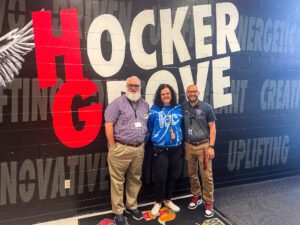Building Bridges for Student Success: BIST Program Uplifts Struggling Middle School Student

11 April 2024
 When Melinda Brents first met *Mark, a seventh grader at Hocker Grove Middle School, he was running down the hallway screaming. Not only was it his first day at a new school, but Mark was also adjusting to a new living situation at home after moving in with his great aunt and uncle. He was overstimulated, overwhelmed, and out of control.
When Melinda Brents first met *Mark, a seventh grader at Hocker Grove Middle School, he was running down the hallway screaming. Not only was it his first day at a new school, but Mark was also adjusting to a new living situation at home after moving in with his great aunt and uncle. He was overstimulated, overwhelmed, and out of control.
Melinda, who goes by Mendy, was called in by walkie-talkie to help. Now in her tenth year as a middle school counselor, Mendy is a trusted resource for students and teachers at Hocker and is well-versed in the BIST Model, which supports students who struggle with behavior.
Instinctively, the moment she saw Mark, she yelled, “Mark, please sit and be safe!” And seconds later, he did.
This was just the beginning, however, of a challenging period of time to help Mark find success in school. For months, he struggled to stay in the classroom for more than five minutes. He would storm out of class angrily, slam doors, and swear at teachers and administrators. Mark fled the school building on foot several times, and once, staff had to talk him out of a tree.
Many adults faced with this behavior would justifiably want to give up on the student. In fact, the adults at Mark’s previous school had done precisely that. Mark spent significant time sitting in the principal’s office doing what he wanted. Fortunately, Hocker is one of many schools in the Kansas City area that has adopted the BIST Model, providing them with the tools and structure to support students like Mark and outlast his behavior.

“Now, he comes to Hocker, and they’re not lowering their expectations for him,” said Christopher Eager, BIST Consultant. “Instead, they’re going to increase their support.”
For the past eight years, Christopher has been visiting Hocker once a month to observe classrooms, meet with teachers and building leaders, and support the adult community in implementing BIST with students.
“A lot of our work is getting teachers to think about kids who struggle in a different way,” said Christopher. “For kids who are struggling, the traditional things haven’t worked for them.”
A temporary solution to Mark’s out-of-control behavior was to create a safe space for him in Mendy’s office. While there, he was able to be in a quiet, predictable environment where he could draw, play with Legos, and talk with Mendy to work through some of his concerns. The next big step was to bring the adult community at Hocker together to collectively support Mark – and each other.
“Traditionally, teachers have been taught that if they have a hard kid that is struggling, they need to deal with it alone,” said Christopher. “We believe this is a team approach, and we need to collaborate.”
To create this consistency of care, the adults who interacted with Mark had to work together to adopt common language and expectations, increasing predictability and, ultimately, a sense of trust. It also required them to start viewing problematic behaviors as a missing skill, not a personality deficit – a fundamental belief within the BIST Model. When adults view behaviors as a missing skill, they can more easily draw on their abilities as educators to teach the skill in a less emotionally reactive manner.
Progress for Mark started small and late in the first semester. Slowly, he began to build up his capacity to stay in the classroom – from five minutes to ten, then 15 minutes. He required fewer rewards to do assignments and tests. He learned how to regulate his big emotions and excuse himself from class to take breaks.
School staff did notice a regression in his behaviors after the holiday break, which is expected, but they managed to stay committed to the work and Mark’s success.
By February, Mark’s progress was undeniable.
“More and more, Mark stays in his classes ninety-five percent of the hour – sometimes the whole hour,” said Mendy. “He does work for most of his teachers and jokes around with them and some of the kids.”
In March, Mark went on a celebratory field trip for students with no Ds, Fs, or in-school suspensions. He was also awarded “Excellent Eagle” at school for improved behavior.
One day, after cooking class, Mark brought Mendy a plate of macaroni and cheese that he had prepared himself. That same week, he made hot chocolate at home and hand-delivered a cup to the principal.
“We both laughed and said it seemed like yesterday we were talking him out of the tree,” said Mendy.
 More recently, Mark completed a research project for English class that included presenting in front of his peers and grading each other’s assignments.
More recently, Mark completed a research project for English class that included presenting in front of his peers and grading each other’s assignments.
“Our jaws were hitting the floor – he was participating like any other kid,” said the English teacher, “It was a huge win. It rejuvenates me and makes me want to do more.”
Now that the school year is nearing an end, “doing more” looks like preparing Mark for the next school year.
“The idea is that we’re going to start making the transition to eighth grade right now,” said Christopher. “This is big in BIST. We have to have the right teachers for him and start introducing them early on.”
Having the right people in place to support Mark when he arrived at Hocker was essential to his progress and will be moving forward – even when Mark continues on to high school.
“In each building, I’m looking for people who can champion this. When you champion this work, it becomes part of your life,” said Christopher.
At Hocker, that champion is Mendy, who models the BIST philosophy of grace and accountability with students and teaches them to new staff members. Christopher also credits Seth Turner, the assistant principal at Hocker, who, in his first year on the job, was willing to learn, ask for help, and vulnerably lead the way with his team.
“He has done such a good job,” said Christopher. “It would be so easy to reject a kid like Mark, but these two people stuck in there with him.”
Mendy and Seth also believe that the family partnership and support at home were critical to Mark’s success.
“I’ve learned more than ever, through the difficult times, that we must treat kids with dignity while balancing grace and accountability,” said Mendy. “We know there will be hard days, but how far he has come and how much he will continue to grow.”
*name changed to protect privacy

